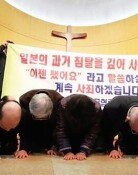It is not a matter of giving temporary investigation rights to prosecution
It is not a matter of giving temporary investigation rights to prosecution
Posted April. 26, 2022 08:20,
Updated April. 26, 2022 08:20
The attendees of the top representative meeting of the People Power Party canceled on Monday the agreement on National Assembly Speaker Park Byeong-seug’s arbitration plan to provide the prosecution with supplementary investigation rights, rather than depriving the prosecution of its direct investigation rights, except for economic and corruption cases, and decided to revisit the matter again. It is because of pressure both inside and outside the party that the prosecution should maintain direct investigation rights for crimes related to public offices and elections. The Democratic Party of Korea is opposing the People Power Party’s withdrawal from the bipartisan agreement and some are calling for the passage of the original plan.
It was an unacceptable behavior that the Democratic Party of Korea brought up the bill to deprive the prosecution of its function of investigation two weeks ago when the adjustment of investigation rights between the prosecution and the police made a year ago hasn’t even been settled in yet and pushed for the bill’s passage by the end of this month. It is also not desirable that the People Power Party reversed an agreement made with its floor leader, having acquired an approval from a general meeting of the party’s members, especially considering that the party did not refuse the revised bill on the ground that it does not follow the principles of a criminal justice system reform.
The People Power Party does not have the power to continue to insist on additional requirements. It does not have enough justification as the party agreed to the revised bill. However, the Democratic Party of Korea will go with the National Assembly speaker’s arbitration plan as insisting on the original plan as revenge for the People Power Party’s withdrawal from the agreement will face public objection. It seems that the leadership of the People Power Party decided to discuss the matter again, anticipating that the Democratic Party of Korea won’t be able to go back to the original plan.
“The revised bill only temporarily delays the implementation of the original plan,” Prosecutor General Kim Oh-soo said. He is right. The direct investigation rights of the prosecution for economic and corruption cases will have to be transferred to the investigative office for serious crimes once it is established. Even if the People Power Party’s additional requests are accepted, it doesn’t mean much more to the prosecution than temporarily having direct investigation rights for one or two matters.
As a party is trying to deprive the prosecution of its direct investigation rights as soon as possible and the other is trying to make sure that the prosecution has the rights, even if temporarily, a criminal justice system reform has become a matter of giving one or two direct investigation rights to the prosecution. The desirable state of the criminal justice system is to have investigative agencies, such as the police, to carry out the investigation while making sure that the prosecution can get involved when necessary by commanding investigation or directly investigating. This is how to prevent holes in investigation and abuse of power by the prosecution or investigative agencies. It was the Democratic Party of Korea’s fault to push without giving much time for consideration but it is also regretful that the People Power Party is also going back and forth.







